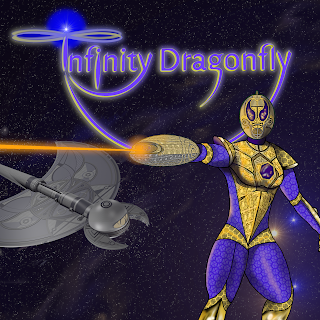Review: 13: The Astonishing Lives of the Neuromantics
13 is looking for Camille. She stole his heart.
She also took his arms...
In this near-future dystopia the poor sell their body parts to the rich. The gulf between the haves and the have-nots is great; some of the elite have even emigrated to orbital habitats, far from the squalor of the Earth below.
The reason 13 has a number instead of a name is because his parents continued to produce child after child until one of their offspring displayed a valuable asset: 13 is artistic, which makes his arms an attractive commodity. It is the only hope of lifting him and his mother out of poverty.
The trade in flesh is big business for the transplant clinics and the streets are filled with their motivational placards:
YOU ARE NOT SPECIAL - SELL IT
SELL YOUR SPECIAL TO SOMEONE WHO DESERVES IT
YOU NEED MONEY NOT TALENT
Donors receive fully-functional prosthetic replacement organs and limbs, but when you live in a world in which you can literally sell yourself off piece by piece, how much can you lose and still be you?
13: The Astonishing Lives of the Neuromantics by writer/artist Yves Navant is an unsettling, quirky and deeply personal story of loss, exploration and transformation. Our hero inhabits a broken-down landscape in which the conspicuously bizarre privileged class prey upon the dispossessed like grotesque vultures. This is a modern allegory highlighting people's willingness to trade their bodies and souls for cash. Those whose self-esteem is at such a low point often see it as a good deal. Those who profit from such transactions have a vested interest in perpetuating the victims' feelings of cheapness.
13: The Astonishing Lives of the Neuromantics by writer/artist Yves Navant is an unsettling, quirky and deeply personal story of loss, exploration and transformation. Our hero inhabits a broken-down landscape in which the conspicuously bizarre privileged class prey upon the dispossessed like grotesque vultures. This is a modern allegory highlighting people's willingness to trade their bodies and souls for cash. Those whose self-esteem is at such a low point often see it as a good deal. Those who profit from such transactions have a vested interest in perpetuating the victims' feelings of cheapness.
Issues of self-worth and self-image are central to the story. Superficial vanity is not reserved only for the upper echelons; 13’s new cybernetic arms are – ironically – shiny, finely crafted golden works of art. Navant’s characters are all rendered as beautiful creatures in a somewhat decadent fashion. Everyone – male, female, gender uncertain – has a lean, toned physique topped with a sculpted, androgynous face.
The camp aesthetic is integral to the drama in which an oppressive government imposes severe punishment for any deviations from the traditional heterosexual norm. In a world in which people are made to feel subhuman for not being "normal", self-hatred robs the subject of all strength. The symbolism here is harrowing: traumatised children often draw pictures of themselves without arms: powerless.
Of course this prevailing moralism does not stop those in power from hypocritically breaking the rules, playing with gender and sexual roles (Camille with her evil drag queen chic and her transgender entourage of "avant-garde bullies") and abusing their authority (security guards raping destitute young men as an ego-boosting initiation for new recruits). Society is twisted so that the demoralisation of the lower classes directly amplifies the self-obsessed conceit of the elite.
The most invasive aspect of all this is that the glamorous vampires are revered by those they exploit. The true victims here are those who, deep in their hearts, want to be just like those who abuse them (identification with the aggressor). 13's surname is Narcisse, from the classical legend of the youth who fell in love with his own reflection.
Our hero is a rebel, however. He does not hunger for unattainable trappings of perfection, he only wants to be made whole. His quest to find what is missing, though, takes unexpected turns.
13's journey is an agonising ordeal, and at the end of the book the author shares with us how what we are reading is autobiographical catharsis. Navant was depressed and suicidal, caring for his terminally ill mother as he created this work, exorcising his own personal demons by committing them to paper. Pain radiates from the page, but deeply entwined within the thorns are the buds of a fragile hope.
"This story is a weapon.
It saved my life."
Zak Webber
Twitter - @sfcomicartist / Instagram - @sfcomicartist
JOIN US ON FACEBOOK! - SCI-FI COMIC NEXUS
*****
***
*




Comments
Post a Comment